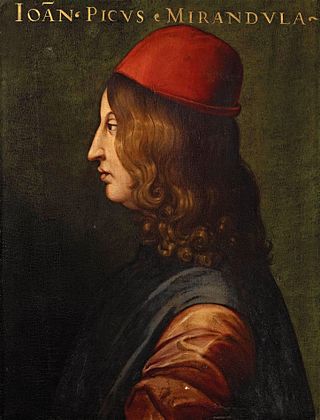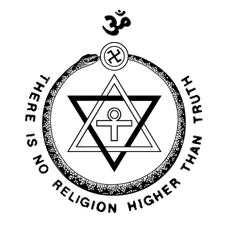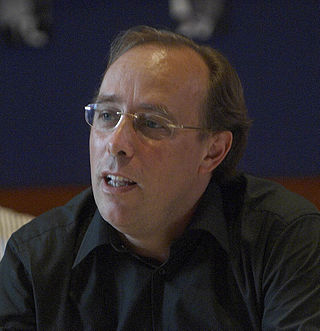Related Research Articles

Marsilio Ficino was an Italian scholar and Catholic priest who was one of the most influential humanist philosophers of the early Italian Renaissance. He was an astrologer, a reviver of Neoplatonism in touch with the major academics of his day, and the first translator of Plato's complete extant works into Latin. His Florentine Academy, an attempt to revive Plato's Academy, influenced the direction and tenor of the Italian Renaissance and the development of European philosophy.
The occult, in the broadest sense, is a category of esoteric supernatural beliefs and practices which generally fall outside the scope of organized religion and science, encompassing phenomena involving otherworldly agency, such as magic and mysticism and their varied spells. It can also refer to supernatural ideas like extra-sensory perception and parapsychology.

Hermes Trismegistus is a legendary Hellenistic period figure that originated as a syncretic combination of the Greek god Hermes and the Egyptian god Thoth. He is the purported author of the Hermetica, a widely diverse series of ancient and medieval pseudepigraphica that lay the basis of various philosophical systems known as Hermeticism.

Giovanni Pico della Mirandola was an Italian Renaissance nobleman and philosopher. He is famed for the events of 1486, when, at the age of 23, he proposed to defend 900 theses on religion, philosophy, natural philosophy, and magic against all comers, for which he wrote the Oration on the Dignity of Man, which has been called the "Manifesto of the Renaissance", and a key text of Renaissance humanism and of what has been called the "Hermetic Reformation". He was the founder of the tradition of Christian Kabbalah, a key tenet of early modern Western esotericism. The 900 Theses was the first printed book to be universally banned by the Church. Pico is sometimes seen as a proto-Protestant, because his 900 theses anticipated many Protestant views.

Georgios Gemistos Plethon, commonly known as Gemistos Plethon, was a Greek scholar and one of the most renowned philosophers of the late Byzantine era. He was a chief pioneer of the revival of Greek scholarship in Western Europe. As revealed in his last literary work, the Nomoi or Book of Laws, which he circulated only among close friends, he rejected Christianity in favour of a return to the worship of the classical Hellenic gods, mixed with ancient wisdom based on Zoroaster and the Magi.

Hermeticism or Hermetism is a philosophical and religious system based on the purported teachings of Hermes Trismegistus. These teachings are contained in the various writings attributed to Hermes, which were produced over a period spanning many centuries and may be very different in content and scope.

The Corpus Hermeticum is a collection of 17 Greek writings whose authorship is traditionally attributed to the legendary Hellenistic figure Hermes Trismegistus, a syncretic combination of the Greek god Hermes and the Egyptian god Thoth. The treatises were originally written between c. 100 and c. 300 CE, but the collection as known today was first compiled by medieval Byzantine editors. It was translated into Latin in the 15th century by the Italian humanist scholars Marsilio Ficino (1433–1499) and Lodovico Lazzarelli (1447–1500).
The perennial philosophy, also referred to as perennialism and perennial wisdom, is a perspective in philosophy and spirituality that views religious traditions as sharing a single, metaphysical truth or origin from which all esoteric and exoteric knowledge and doctrine has grown.

Western esotericism, also known as esotericism, esoterism, and sometimes the Western mystery tradition, is a term scholars use to categorise a wide range of loosely related ideas and movements that developed within Western society. These ideas and currents are united since they are largely distinct both from orthodox Judeo-Christian religion and Enlightenment rationalism. It has influenced various forms of Western philosophy, mysticism, religion, pseudoscience, art, literature, and music.

Isis Unveiled: A Master-Key to the Mysteries of Ancient and Modern Science and Theology, published in 1877, is a book of esoteric philosophy and Helena Petrovna Blavatsky's first major work and a key text in her Theosophical movement.
Agostino Steuco (1497/1498–1548), Italian humanist, Old Testament scholar, Counter Reformation polemicist and antiquarian, was born at Gubbio in Umbria. He discoursed on the subject of perennial philosophy and coined the term philosophia perennis.

Wouter Jacobus Hanegraaff is professor of the History of Hermetic Philosophy and related currents at the University of Amsterdam, Netherlands. He served as the first president of the European Society for the Study of Western Esotericism (ESSWE) from 2005 to 2013.

The body of light, sometimes called the 'astral body' or the 'subtle body,' is a "quasi material" aspect of the human body, being neither solely physical nor solely spiritual, posited by a number of philosophers, and elaborated on according to various esoteric, occult, and mystical teachings. Other terms used for this body include body of glory, spirit-body, luciform body, augoeides, astroeides, and celestial body.

Ludovico Lazzarelli was an Italian poet, philosopher, courtier, hermeticist and (likely) magician and diviner of the early Renaissance.

Renaissance magic was a resurgence in Hermeticism and Neo-Platonic varieties of the magical arts which arose along with Renaissance humanism in the 15th and 16th centuries CE. During the Renaissance period, magic and occult practices underwent significant changes that reflected shifts in cultural, intellectual, and religious perspectives. C. S. Lewis, in his work on English literature, highlighted the transformation in how magic was perceived and portrayed. In medieval stories, magic had a fantastical and fairy-like quality, while in the Renaissance, it became more complex and tied to the idea of hidden knowledge that could be explored through books and rituals. This change is evident in the works of authors like Spenser, Marlowe, Chapman, and Shakespeare, who treated magic as a serious and potentially dangerous pursuit.
Western Esotericism is an academic field of research, scholarship, and education that focuses on the history of Western esotericism.
Platonism, especially in its Neoplatonist form, underwent a revival in the Renaissance as part of a general revival of interest in classical antiquity. Interest in Platonism was especially strong in Florence under the Medici.
Neoplatonism is a version of Platonic philosophy that emerged in the 3rd century AD against the background of Hellenistic philosophy and religion. The term does not encapsulate a set of ideas as much as a series of thinkers. Among the common ideas it maintains is monism, the doctrine that all of reality can be derived from a single principle, "the One".

Many interpreters of Plato held that his writings contain passages with double meanings, called allegories, symbols, or myths, that give the dialogues layers of figurative meaning in addition to their usual literal meaning. These allegorical interpretations of Plato were dominant for more than fifteen hundred years, from about the 1st century CE through the Renaissance and into the 18th century, and were advocated by major Platonist philosophers such as Plotinus, Porphyry, Syrianus, Proclus, and Marsilio Ficino. Beginning with Philo of Alexandria, these views influenced the Jewish, Christian, and Islamic interpretation of these religions' respective sacred scriptures. They spread widely during the Renaissance and contributed to the fashion for allegory among poets such as Dante Alighieri, Edmund Spenser, and William Shakespeare.
The concept of a prisca philosophia refers to a primeval wisdom that was revealed to the prophets and certain holy people. Implicit in this notion is that it is transmissible, it supposedly descends from Adam and through a certain genealogy to the prisci philosophi, or prisci, which refers to "the venerable ones" or "the venerable philosophers and theologians". Truth is supposed to flow from a single spring, but it manifests in various forms. This revelation dates back to the most ancient times, the prisca saecula. People who see themselves as standing in this tradition think that they can find this truth in the scriptures from this age. This truth and wisdom is thus as old as humanity because it was revealed at the beginning of the world by God. It presents a type of knowledge that was once there but later forgotten. The pagan philosophers, like Aristotle have a certain part in it because they are closer to the source of things.
References
- ↑ Yates, F., Giordano Bruno and the Hermetic Tradition, Routledge, London, 1964, pp 14–18 and pp 433–434
- ↑ Hanegraaff, W. J., New Age Religion and Western Culture, SUNY, 1998, p 360.
- ↑ Heiser, James D., Prisci Theologi and the Hermetic Reformation in the Fifteenth Century, Repristination Press, 2011. ISBN 978-1-4610-9382-4
- ↑ http://plato.stanford.edu/archives/sum2015/entries/ficino/, Celenza, Christopher S. "Marsilio Ficino." The Stanford Encyclopedia of Philosophy, Summer 2015 Edition, Edward N. Zalta (ed.) 2015. Stanford University Press
- ↑ Natural Religion and the History of Priestcraft 1660-1722 Chapter 5 from, The Pillars of Priestcraft Shaken: The Church of England and its Enemies, 1660-1730 (1992), by Justin Champion, ISBN 0-521-40536-X
- ↑ Hegel and the Hermetic Tradition by Glenn Alexander Magee
- Hanegraaff, Wouter J. "Tradition". In: Dictionary of Gnosis and Western Esotericism (Wouter J. Hanegraaff, ed.), pp. 1125–1135. Brill, 2006. ISBN 90-04-15231-8.
- Hankins, James. Plato in the Italian Renaissance, 2 vols. Brill, 1990. ISBN 90-04-09161-0.